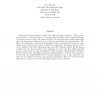Free Online Productivity Tools
i2Speak
i2Symbol
i2OCR
iTex2Img
iWeb2Print
iWeb2Shot
i2Type
iPdf2Split
iPdf2Merge
i2Bopomofo
i2Arabic
i2Style
i2Image
i2PDF
iLatex2Rtf
Sci2ools
110
click to vote
SIGCOMM
1994
ACM
1994
ACM
Making Greed Work in Networks: A Game-Theoretic Analysis of Switch Service Disciplines
This paper discusses congestion control from a game-theoretic perspective. There are two basic premises: (1) users are assumed to be independent and sel sh, and (2) central administrative control is exercised only at the network switches. The operating points resulting from sel sh user behavior depend crucially on the service disciplines implemented in network switches. This e ect is investigated in a simple model consisting of a single exponential server shared by many Poisson sources. We discuss the extent to which one can guarantee, through the choice of switch service disciplines, that these sel sh operating points will be e cient and fair. We also discuss to what extent the choice of switch service disciplines can ensure that these sel sh operating points are unique and are easily and rapidly accessible by simple self-optimization techniques. We show that no service discipline can guarantee optimal e ciency. As for the other properties, we show that the traditional FIFO service d...
Related Content
| Added | 10 Aug 2010 |
| Updated | 10 Aug 2010 |
| Type | Conference |
| Year | 1994 |
| Where | SIGCOMM |
| Authors | Scott Shenker |
Comments (0)

